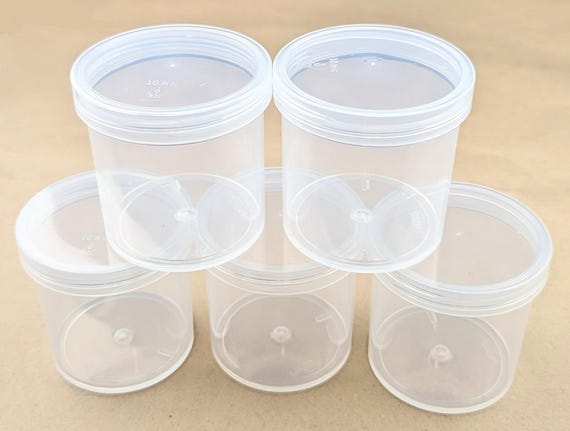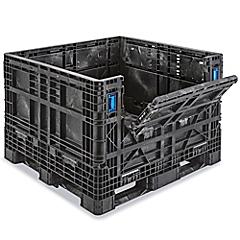Shop now and discover premium bulk plastic containers for sale
Wiki Article
The Role of Mass Plastic Containers in Effective Recycling Practices and Sustainability
Mass plastic containers are indispensable to contemporary recycling initiatives. Their style enhances the effectiveness of product collection and transport, adding to sustainability objectives. These containers not just maximize room but additionally aid in checking contamination levels. Their implementation is not without difficulties. Comprehending the complete scope of their effect exposes a complex partnership in between logistics and ecological duty that necessitates further exploration.Understanding Mass Plastic Containers
Bulk plastic containers offer as a necessary component in numerous markets, facilitating the storage space and transport of goods. These containers are typically made from robust materials such as high-density polyethylene (HDPE) or polypropylene, which provide longevity and resistance to ecological aspects. Their style typically includes features like stackability and modularity, permitting for effective usage of room during both storage space and transit.Industries such as agriculture, food handling, and producing regularly make use of mass plastic containers due to their light-weight nature and simplicity of handling. The containers are available in numerous dimensions and configurations, catering to the details needs of different items. Their convenience prolongs past plain performance; they can likewise be tailored with lids, handles, and identifying choices to improve use - plastic bulk containers. Consequently, mass plastic containers play a crucial duty in maximizing logistics and supply chain procedures throughout multiple industries, consequently adding to overall effectiveness and cost-effectiveness
Benefits of Using Mass Plastic Containers in Recycling
The usage of mass plastic containers greatly improves the performance of the procedure when organizations focus on reusing efforts. These containers are developed to maximize room, permitting the storage and transport of bigger quantities of recyclable materials. This causes fewer trips to recycling facilities, therefore reducing gas intake and linked exhausts.Furthermore, mass plastic containers are immune and resilient to numerous ecological factors, ensuring that materials stay protected during handling and transit. Their light-weight style additionally adds to lower transportation costs.
The uniformity of these containers assists in far better sorting and handling of recyclable products, which can boost overall recycling prices. Organizations that embrace bulk plastic containers also demonstrate a commitment to sustainability, favorably affecting their brand image. Ultimately, these advantages not just simplify reusing techniques however additionally add to more comprehensive environmental goals
Just How Bulk Plastic Containers Facilitate Material Collection
Reliable material collection is considerably improved by the use mass plastic containers, as they supply a reliable and organized solution for collecting recyclable items. These containers are developed to accommodate big quantities of materials, which simplifies the sorting and storage procedure. Their stackable design optimizes room usage, making it easier for centers to organize recyclables without mess.Additionally, mass plastic containers are long lasting and weather-resistant, permitting outside positioning without deterioration. This strength ensures that products continue to be secured till they are gathered for handling.

The harmony in shapes and size of these containers promotes standardization across collection factors, enabling much better monitoring of recyclable quantities. Furthermore, their transparent nature enables simple presence of components, helping in the tracking of contamination degrees and guaranteeing that only ideal materials are gathered. On the whole, mass plastic containers play an essential role in simplifying the material collection process, therefore advertising effective recycling techniques.
Transport Efficiency and Environmental Impact
Transportation efficiency plays a vital function in the reusing procedure, especially with the optimization of tons capability in bulk plastic containers. By optimizing the quantity of product moved, firms can significantly reduce the variety of trips needed, therefore lessening their carbon footprint. This technique not just boosts functional effectiveness but also adds to more lasting ecological methods.
Maximizing Load Ability
Maximizing tons ability is frequently forgotten, it plays a necessary role in improving transport effectiveness and reducing ecological effect in recycling techniques. By optimizing the volume that bulk plastic containers can hold, reusing operations can minimize the variety of trips needed for transportation. This not only reduces gas usage however likewise decreases the wear and tear on vehicles. Efficient lots monitoring allows centers to utilize area effectively, making certain that each transport cycle is as efficient as feasible. Furthermore, well-optimized lots can lead to far better negotiations with logistics carriers, possibly lowering general prices. Inevitably, enhancing lots ability adds to a why not find out more much more sustainable reusing system by fostering efficient resource use and reducing waste produced throughout transport.Decreasing Carbon Footprint
As recycling procedures venture to reduce their environmental impact, reducing the carbon impact connected with transport becomes a crucial goal. Mass plastic containers play a crucial function in accomplishing this purpose by boosting lots performance and maximizing logistics. Their lightweight yet long lasting design permits optimum cargo area utilization, minimizing the variety of journeys called for to transport materials. By consolidating shipments, recycling facilities can lower gas pop over to this site intake and greenhouse gas exhausts. In addition, tactically situating recycling facilities minimizes transportation ranges, additionally lowering carbon outcomes. Using fuel-efficient lorries and alternate power resources boosts general sustainability. By incorporating these methods, the recycling industry can appreciably reduce its carbon impact, adding to a much more lasting future.Challenges in the Usage of Mass Plastic Containers

Contamination Issues
Contamination issues represent a considerable difficulty in the efficient use of bulk plastic containers within reusing methods. These containers frequently gather deposits from previous contents, bring about combined materials that can prevent the recycling procedure. Pollutants such as food waste, chemicals, or non-recyclable materials can jeopardize the stability of the entire batch, causing raised disposal costs and reduced recycling rates. Additionally, improper cleaning or sorting can exacerbate these concerns, making it tough for recycling centers to process materials successfully. The existence of contaminants not only affects the high quality of recycled items however likewise threatens the total sustainability efforts focused on decreasing plastic waste. Dealing with these contamination difficulties is important for enhancing the effectiveness of mass plastic container recycling.Recycling Infrastructure Limitations
Inefficiency in recycling framework positions considerable obstacles for the efficient monitoring of bulk plastic containers. Many reusing facilities do not have the capacity to refine large volumes of plastic bulk containers these containers successfully, leading to enhanced prices and hold-ups. Poor arranging technologies commonly lead to contamination, as bulk containers might be mixed with various other materials, complicating the reusing procedure. Restricted transport alternatives also hinder the movement of mass plastic containers to appropriate recycling facilities, leading to increased garbage dump waste. In addition, a lack of standard procedures for bulk container recycling produces complication among consumers and services, further complicating initiatives to advertise sustainability. Addressing these infrastructure limitations is important to improve recycling techniques and take full advantage of the capacity of mass plastic containers in a circular economic situation.Best Practices for Implementing Bulk Plastic Containers
They should focus on a critical approach that enhances efficiency and lowers contamination dangers when companies think about applying bulk plastic containers in their reusing practices. Picking the suitable container size and type is essential to accommodate the volume of products being refined. Organizations should also develop clear labeling and signs to direct customers on proper disposal approaches, lessening confusion and errors. Normal training sessions for team can additionally reinforce these practices, making certain every person recognizes their functions in maintaining recycling honesty.
Furthermore, companies should implement a regular upkeep timetable to inspect and tidy containers, protecting against the build-up of pollutants. Partnering with regional recycling centers can likewise improve the collection procedure, making sure that materials are efficiently processed. Companies should keep track of and evaluate their recycling metrics, using this data to refine practices over time and promote constant improvement in their sustainability initiatives.
The Future of Bulk Plastic Containers in Lasting Practices
As organizations significantly focus on sustainability, the function of mass plastic containers in recycling practices is established to progress considerably. Innovations in materials scientific research are causing the advancement of biodegradable and recyclable alternatives, boosting the environmental advantages of mass plastic containers. Additionally, the execution of closed-loop systems will enable easier collection and repurposing of these containers, minimizing waste and source consumption.Technical advancements, such as smart tracking systems, will certainly enable business to check the lifecycle of bulk containers, boosting effectiveness in recycling procedures. As consumer need for sustainable techniques grows, businesses will likely take on mass plastic containers developed for reuse and long-lasting worth. Furthermore, cooperation between markets and federal governments will certainly cultivate the facility of standard recycling protocols, ensuring that bulk containers are effectively integrated into wider sustainability initiatives. On the whole, the future of mass plastic containers appears appealing, with significant possibility for adding to a circular economic climate.
Often Asked Concerns
Just How Are Mass Plastic Containers Made and What Products Are Utilized?
Bulk plastic containers are normally made from high-density polyethylene (HDPE) or polypropylene (PP) These materials are processed with injection molding or strike molding strategies, causing durable, lightweight containers suitable for numerous storage space and transportation needs.
Can Mass Plastic Containers Be Recycled Several Times Before Recycling?
Yes, bulk plastic containers can be recycled several times before recycling. Their sturdiness and design allow for duplicated use in various applications, promoting sustainability and source performance while decreasing the need for new containers.
What Certifications Exist for Mass Plastic Containers in Recycling?
Different qualifications for bulk plastic containers consist of the Recycling Collaboration's accreditation, the Cradle to Cradle Qualified ™ requirement, and the Lasting Packaging Union's standards, guaranteeing containers fulfill particular ecological and recyclability criteria for efficient recycling.Just How Do Bulk Plastic Containers Compare to Various Other Recycling Storage Options?
Mass plastic containers use greater toughness and capacity compared to various other recycling storage choices, lowering the risk of contamination and assisting in reliable transportation. Their layout supports much better company, improving total efficiency in reusing operations.What Is the Lifespan of a Bulk Plastic Container in Recycling Processes?
The lifespan of a bulk plastic container in recycling processes normally varies from 5 to 10 years, depending on usage, material top quality, and ecological problems, permitting for multiple cycles of usage prior to ultimate disposal or recycling.When organizations prioritize reusing efforts, the application of bulk plastic containers substantially improves the efficiency of the process. Transport effectiveness plays an essential function in the reusing process, particularly via the optimization of tons ability in mass plastic containers. The use of bulk plastic containers in recycling practices faces significant challenges, particularly concerning contamination concerns and restrictions within recycling infrastructure. Contamination issues stand for a significant obstacle in the reliable usage of bulk plastic containers within reusing techniques. When companies take into consideration applying mass plastic containers in their reusing methods, they must prioritize a strategic technique that improves efficiency and reduces contamination risks.
Report this wiki page